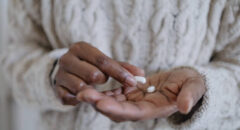
Day 'n' nite
I toss and turn, I keep stress in my mind, mind
I look for peace, but see, I don't attain
Kid Cudi’s lyrics from his debut single “Day ’N’ Nite” spoke of a man struggling to find peace in his own mind even in the beautifulest form of artistry. On an early October 2016 evening, the Cleveland rapper posted a status to his Facebook page explaining his recent decision to enter himself into rehab after battling depression, anxiety and suicidal tendencies for years.
MUST READ: Black Men & Depression: "I Refuse To Let Anyone Else Suffer In Silence"
He wrote:
“Yesterday I checked myself into rehab for depression and suicidal urges. I am not at peace. I haven't been since you've known me. If I didn't come here, I wouldve done something to myself. I simply am a damaged human swimming in a pool of emotions everyday of my life. Theres a ragin violent storm inside of my heart at all times. Idk what peace feels like. Idk how to relax. My anxiety and depression have ruled my life for as long as I can remember and I never leave the house because of it. I cant make new friends because of it. I dont trust anyone because of it and Im tired of being held back in my life. I deserve to have peace. I deserve to be happy and smiling. Why not me?”
Cudi’s recent admission to the world is a powerful step towards healing that many of our men don’t take. Statistics have shown that more women attempt suicide, but men successfully complete suicide more than women. Although the Black male suicide rate is one of the lowest amongst all ethnicities, it's still the third leading cause of death for Black men ages 15-24 according to the CDC .
Mental illness is a silent killer in our community as a whole, but many Black men suffer in silence for reasons larger than most can comprehend themselves. As we’ve seen with music executives Chris Lighty and Shakir Stewart, money and fame don’t equate happiness as both of them decided to take their own lives unbeknownst to the people around them. The deaths of these two musical giants opened up a larger conversation for the need for mental health care in the Black community.
Depression is an often misunderstood term in our community. Some believe that only weak people are depressed and some have the notion that it’s only a feeling. Dr. Erlanger Turner, Assistant Professor at University of Houston-Downtown, sits down with BlackDoctor.org to talk about Black men and depression, and what happens inside of a rehabilitation facility.
MUST READ: Life Behind Scars: What They Don't Tell You About Psychiatric Hospitals I Must
BlackDoctor.org: Kid Cudi expressed that he didn’t know what feeling at peace was like. What is considered a normal mental state as opposed to the chaos that Kid Cudi felt?
Dr. Turner: Normal mental state is being able to make good judgments about decisions and being able to cope with normal life stress. As opposed to feeling distressed, worried or constantly overwhelmed by life. It must have been really difficult for Kid Cudi to work on being successful in his career while struggling with depression and anxiety. Which would reflect his feeling of being in “chaos.”

BlackDoctor.org: In your work with Black male patients what do you see is the biggest hurdle to their mental health?
Dr. Turner: I think one of biggest challenges with Black male patients is that they find it hard to talk about their feelings or be vulnerable in a therapy session. Often Black men are taught from a very young age to be tough. Society often expresses that it is not a masculine trait to be sad, cry, or talk about your feelings. As a psychologist, I have learned to meet patients where they are and not push them to soon to talk about feelings.
BlackDoctor.org: What’s the difference between being depressed and normal sadness?
Dr. Turner: We all experiences sadness at some point. Sadness often occurring when we experience a negative event or disappointment. It is often a negative emotion that is brief and connected to a specific situation or event. On the other hand, depression is a mood that is long lasting. Depression often impacts other areas of your life and may cause poor sleeping habits, overeating, or lack of energy.
MUST READ: Black Boys, Suicide & Shame: What Can The Village Do?
BlackDoctor.org: What does it feel like for those suffering from depression?
Dr. Turner: For those who suffer from depression, it feels like they are carrying a heavy burden that will never get better. People are often hopeless, irritable or angry, lack any positive outlook, and feel like being isolated.
BlackDoctor.org: Can you talk to us about high-functioning depressed people ? Kid Cudi was an artist whose amassed a great level of success and most wouldn’t think that he would be a candidate for depression.
Dr. Turner: I don’t know if “High functioning” depressed people exists. However, there may be people that are depressed but present themselves to friends and family as if things are going well. For example, they may continue to engage in their day to day activities, but in private may be holding in negative emotions or thoughts (such as suicide). Additionally, those individuals may use drugs and alcohol as a way to self-medicate and cope with their depression.
MUST READ: Ending the Silent Suffering of Black Boys
BlackDoctor.org: What happens inside of rehab?
Dr. Turner: Treatment for depression can be done outpatient with an individual therapist or psychologist. However, rehab or inpatient treatment is often recommended for more severe depression. Inpatient treatment typically involved medication plus individual and/or group therapy. Therapy often helps the person to identify the root of their depression and develop healthy ways to talk about their emotions, situations, or thought processes. This helps to address the person’s negative thoughts that may lead to depression and engage in behaviors to prevent experience another episode of depression.
For more information and resources, visit the Substance Abuse & Mental Health Services Administration (SAMHSA). If you or a loved one is in need of support, call the National Suicide Prevention Lifeline at 800-273-TALK.









